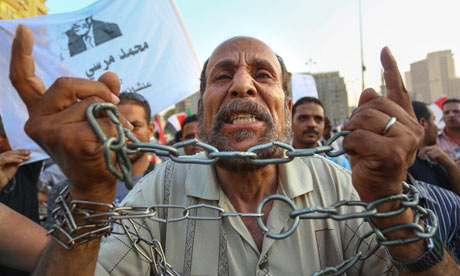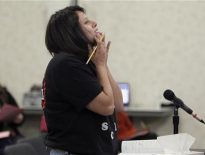The Muslim Brotherhood has vowed to face down Egypt’s ruling generals in a “life or death” struggle over the country’s political future, after declaring that its candidate had won the presidential election and would refuse to accept the junta’s last-ditch attempts to engineer a constitutional coup.

As final ballot results trickled in and unofficial tallies suggested that Mohamed Morsi had secured approximately 52% of the popular vote, the Brotherhood deployed its harshest language yet against the Supreme Council of the Armed Forces (Scaf), promising to bring millions of Egyptians back on to the streets if attempts to rebuild the old regime continued.
“Over the past 18 months we were very keen to avoid any clashes or confrontations with other components of Egypt’s political system because we felt that it would have negative consequences for the democratic system and for society as a whole,” said Fatema AbouZeid, a senior policy researcher for the Brotherhood’s Freedom and Justice party and a media co-ordinator for the Morsi campaign.
“But now it’s very clear that Scaf and other institutions of the state are determined to stand in the way of what we’re trying to achieve, and we won’t accept this any more. Egypt will not go back to the old regime through any means, legal or illegal. “If we find that Scaf stands firm against us as we try to fulfil the demands of the revolution, we will go back to the streets and escalate things peacefully to the highest possible stage,” she said.
“Now we have a new factor in Egyptian politics, the Egyptian people themselves, who will not accept a return to the old regime in any form, not after so much Egyptian blood was shed to remove it. “The revolution is facing a life or death moment and the Egyptian people have put their faith in Dr Morsi to represent them at this time.” On Monday the parliamentary speaker, Saad el-Katatni, a Brotherhood veteran, said he did not recognise last week’s decision by Mubarak-era judges in Egypt’s supreme constitutional court to dissolve the legislature, a move widely viewed as highly politicised and designed to bolster the generals. Katatni said MPs planned to attend parliament – which was surrounded by armed soldiers – as usual on Tuesday or convene in nearby Tahrir Square, setting the stage for a showdown between the generals who have held sway for six decades and the long-outlawed Islamist movement now on the brink of political control.
An 11th-hour constitutional declaration issued unilaterally by Scaf awarded the generals sweeping powers including the right to put forward legislation and an effective veto over clauses in the new constitution, and formalised the army’s ability to detain civilians and sweep out of barracks at moments of “internal unrest”. Political analysts described the move as a constitutional obscenity and said it left the three major institutions of the post-Mubarak Egyptian state – the presidency (now curtailed), the parliament (now dissolved) and the constitutional assembly (now floundering in legal uncertainty) – all under the full or partial influence of the armed forces. “Military encroachment on civilian authority has been a pretty constant process over the past year and a half but this really embeds it,” said Heba Morayef, of Human Rights Watch.
“In the past 18 months we’ve already seen the military literally get away with murder. The military’s involvement in civilian law enforcement without the oversight of the civilian judiciary, as outlined in this declaration, is a recipe for abuse and impunity, and it sends a terrifying signal about what measures may be in the works when it comes to dealing with future protests against military rule.” At a press conference on Monday Scaf generals insisted their motives had been misinterpreted, and repeated their commitment to handing over executive authority to the new president by the end of the month – a handover that many Egyptians now view as largely meaningless. With 99% of the presidential ballot papers tabulated, the Brotherhood claimed Morsi had garnered 13.2m votes, against 12.3m for his rival, Ahmed Shafiq, who served as Hosni Mubarak’s final prime minister. In an early morning address to the nation, Morsi promised to stand for the whole of a deeply fractured country, not just the portion of it that voted for him. “I will be serving all Egyptians,” he declared, “and standing at an equal distance from all of them.” Chants of “God is great” and “down with military rule” rang out and supporters spilled out into the streets to celebrate.
Their headquarters sit across the road from the interior ministry, which once housed many Brotherhood members behind its high walls. Shafiq’s team dismissed the Brotherhood’s celebrations as premature and said their own tallies suggested that a win for their candidate was “beyond all doubt”. Initial results contain a margin of error of about two percentage points and both sides can launch appeals against the conduct of the vote before official results are announced on Thursday. But by Monday evening it seemed increasingly likely that Morsi had done enough to become the first democratically elected president in Egypt’s history. Revolutionaries expressed optimism that that the twists and turns of the past week would reanimate the struggle for change.
“I’m not pessimistic at all,” said Salma Said, a 26-year-old campaigner with the alternative media collective Mosireen. “I think the fight is going to be tougher, just like any game gets harder in the later levels, but what the revolutionaries really need to do now is unite. “People are already making lists of urgent demands to put to the new president and which must be met within the next few months. Now we can stop being distracted by elections and get back to work on what’s really needed: releasing military prisoners, retrying those convicted in military courts, implementing a minimum and maximum wage, and so on.
” Said said the Brotherhood had consistently weakened the revolutionary front but a Morsi victory was preferable to a Shafiq one because it opened up new political space and allowed revolutionaries to move beyond rallies in Tahrir Square and engage with Egyptians in bigger and more creative ways. “The Egyptian government and the western media always try to equate Tahrir with the revolution and vice versa in an effort to limit the space of the revolution, but that utopian, materialistic image of Tahrir has long been distorted,” she said. “Now we need to concentrate on mass marches across the whole country. Tahrir can be a start or end point, but no longer just a destination in its own right.”





